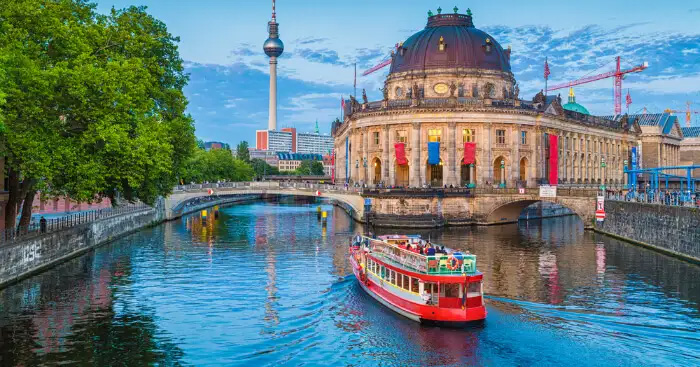Can Germany’s tourism industry become climate neutral?
In the northern German town of Ueckermünde, the Haffhus hotel and spa is a model among sustainability leaders in the tourism industry.
The establishment derives its heating, cooling and electricity entirely from renewable sources — and even produces all its own energy. In 2018, the hotel cut its connection to the public power grid and has been self-sufficient ever since, says Dirk Klein, sustainability manager of the Haffhus.
Germany must be greenhouse gas neutral by 2045
Yet the entire tourism industry will have to make similar changes by 2045. According to the Climate Protection Act, Germany must then be greenhouse gas neutral by this date. This means there must be a balance between greenhouse gas emissions and the removal of such gasses from the atmosphere. Then, by 2050, Germany aims to go even further and achieve a negative emissions balance.
According to Germany’s Federal Statistical Office, the tourism industry accounts for only 2.6% of the country’s total greenhouse gas emissions. Nevertheless, the travel sector must also do its part to reach the target. The Federal Association of the German Tourism Industry, for example, recently stated that it is aware that the tourism industry has to approach the issue of climate protection and sustainability differently than it has in the past.
Indeed, achieving climate neutrality poses a major challenge, says Heinz-Dieter Quack, professor at the Institute for Tourism and Regional Research at Ostfalia University of Applied Sciences in the German city of Salzgitter. “Especially because tourism involves traveling.”Going to and from a vacation destination is usually what creates the majority of a tourist’s CO2 emissions. Since there’s unlikely to be climate-neutral air travel anytime soon, vacationers have to find alternatives, says Quack — like traveling by bus and train instead of plane.
Circular economy helps reduce emissions
“Transportation is the obvious,” says Quack. “But at the end, it’s also about how people behave at the destination.” This is where the circular economy can help reduce emissions. The industry has to consider the food and products guests consume at hotels and restaurants and look at how they are procured; whether or not they are imported or produced regionally and under what conditions. The sustainability of building materials used to create new accommodations is another area that can be examined. Such aspects would have a direct impact on CO2 emissions.
Quack is unsure whether traveler’s decisions and those of individual hotels and restaurants will be enough: “I cannot say to what extent we will be climate neutral by 2045.” According to a report by the German government’s Competence Center for Tourism, of which Quack is director, “a detailed and agreed-upon national strategy for climate protection and sustainability in tourism is lacking.” One of the reasons for this, Quack says, is that each German state is responsible for drawing up its own rules and regulations.
Some CO2 emissions will remain
Harald Zeiss, a professor at the Harz University of Applied Sciences in Wernigerode whose research focuses on sustainability in tourism, points out that the industry consists of many different sectors and is therefore difficult to treat as a single entity. “Also, requirements imposed by the government quickly lead to competitive disadvantages,” points out the travel expert. Instead, he calls for an international sustainability strategy.
Marion Schuster of the company Fokus Zukunft, which develops sustainability strategies and makes greenhouse gas inventories for hotels, knows what the CO2 footprint of the average hotel guest consists of. Production and transportation of food accounted for the bulk of emissions, followed by heating and laundry. A hotel can hardly be 100% carbon neutral, says Schuster. “There will always be a remaining value.” A few years ago, the German Hotel and Restaurant Association determined that between 17 and 50 kilograms of CO2 are produced per guest per overnight stay, depending on the hotel’s star category.
Meat from the hotel’s farm
Andrea Fend and her family have already significantly reduced their hotel’s CO2 emissions. They run the Moor & Mehr spa hotel in Bad Kohlgrub in the Ammergau Alps in Bavaria — and have made it almost entirely climate-neutral. Their establishment uses a wood chip heating system and a photovoltaic system which converts thermal energy into electricity.
The organic meat they serve comes from the hotel’s own farm, while all other food products are purchased from local producers as much as possible. Yet despite such efforts, 7.53 kilograms of CO2 are still produced per guest per day. To ensure that the carbon footprint of guests doesn’t get any bigger, they’re given a guest pass by the regional tourism association which allows them to travel for free on buses in the area.
Such measures to support public transportation are but a dream up in northern Germany at the Haffhus hotel in Ueckermünde. “Here, public transport stops operating completely during the school holidays,” says Dirk Klein. This means travelers’ CO2 footprint skyrockets, since many drive cars around. “Traffic is the big problem. We can make the accommodations as sustainable as we want: Unless something fundamental happens, we won’t reach the goal of climate neutrality.”

